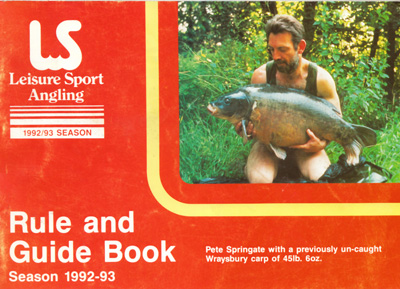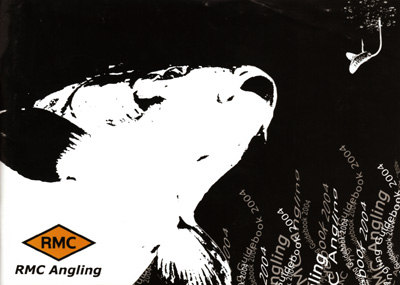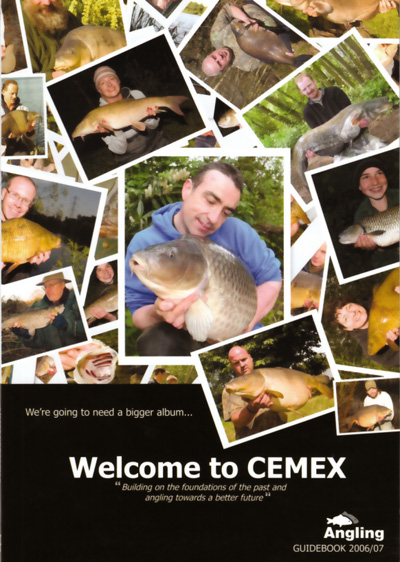Just as Don McLean can remember ‘the day the music died’ so I can remember the day CEMEX Angling died and it was not, as you might expect, with the sad announcement this week that the organisation is for sale; CEMEX Angling died ‘a long, long time ago…’
This is not an easy piece to write and indeed it is not by any means an objective piece as I spent some 15 years of my life creating what eventually grew into CEMEX Angling. To see my ‘baby’ grow up and begin to mature was wonderfully exciting but to then see it slowly strangled and now to see it finally finished off was, and is, incredibly painful. On a slightly more positive note although CEMEX Angling will be dead at least some of the components – the fisheries – that made it what it was will continue and, one hopes, at least some of them will find new owners who will love them and nurture them as I once did.
A very brief History:
CEMEX Angling began its life as Hall’s Angling Scheme (HAS) back in the late 1960’s and it was established to provide innovative, practical and profitable after use for the worked out sites left after the quarrying activities of Hall’s Aggregates. The business in those early days was based above the Davies Angling Tackle Shop in Church Street, Staines with John Newby and his assistant, Jack Ashford, managing the business.
 Re-location to the then newly established Thorpe Park took place with the acquisition of Hall’s by Ready Mixed Concrete (RMC) and the angling operation became part of Leisure Sport Ltd, a wholly owned subsidiary of RMC, and the company established to manage the theme park which was being created on the Thorpe site. With the change of company came a change of name to Leisure Sport Angling (LSA), Jack Ashford assumed full control, and the waters managed in those days included some very well known to current carp anglers: Wraysbury and Yateley being two of the more prominent ones.
Re-location to the then newly established Thorpe Park took place with the acquisition of Hall’s by Ready Mixed Concrete (RMC) and the angling operation became part of Leisure Sport Ltd, a wholly owned subsidiary of RMC, and the company established to manage the theme park which was being created on the Thorpe site. With the change of company came a change of name to Leisure Sport Angling (LSA), Jack Ashford assumed full control, and the waters managed in those days included some very well known to current carp anglers: Wraysbury and Yateley being two of the more prominent ones.
I joined LSA straight from university and remember walking into the smoke filled Portacabin stuck out of sight (and some would say out of mind) of the main theme park for my first day at work like it was yesterday. Jack was a chain smoker, so was Glenys his secretary and back in those days I was a 30-a-day Marlboro man myself. No air-con, then, the windows frequently wouldn’t open properly everything was a sticky yellow fug…
Jack retired soon after I joined and I got to grips with running the business which, I soon found, had been operating at a massive financial loss. LSA was being run as an angling club, not a business, there was no ‘plan’ and the powers that be at Leisure Sport were, perhaps understandably, not at all keen on the grubby little office which delivered a whacking great loss to their budget figures every month.
I can remember presenting my first ever budget to Leisure Sport boss Colin Dawson in the October of – I think it would have been 1990. I had included in my outgoings a sum of £20K for buying fish and he could really not get his head around it at all. I was told in no uncertain terms that ‘Never before in the history of the angling business has anyone ever asked to buy fish – fish breed don’t they, why do you need more?’
With a loss of some £75K the year I joined going into a finance meeting asking to spend £20K on fish the following year when nobody had spent anything on the business before was perhaps a little foolish, especially as I wasn’t exactly straight out of Harvard with an MBA and a business plan to back it up. I was out of a scientific fisheries and freshwater biology background and knew as much about business as I did about brain surgery. What I did know though was anglers and what they wanted, and I knew how to deliver to those needs – or at least I knew how to try.
To his eternal credit Colin listened to my arguments and, although I didn’t get everything I wanted, I did get enough to start to make LSA commercial with the promise that I might get more the following year if the figures – and the business plan I would have to write and the spread sheets I would have to create – stacked up. I was quick to point out that this wasn’t a ‘quick fix’ that the fisheries I wanted to create wouldn’t happen overnight, and again I was listened to, even if understanding was perhaps not fully there.
If I failed LSA would make an even more horrible loss than previously and I would look a total arse – not for the first time I hasten to add! What would not happen though, even if I bombed catastrophically, was that LSA would be sold off – that was just not an option because to RMC Leisure Sport Angling, and its after use activities, was an absolute goldmine.
The reason for this value was that when a worked out site which had been subsequently managed for leisure after use was subsequently sold on for development (housing etc) then the owning company (RMC) were able to claim back huge amounts of tax in rollover relief. We were a tax dodge, totally legal and above board, but the only reason angling existed within RMC was for the fisheries to be sold on for development and the tax clawed back. Security of a sort…
As expected my meagre fishery investments didn’t work overnight – they were never going to – but the deficit reduction slowly began to work and it didn’t take too long before LSA moved into the black. At roughly the same time Leisure Sport Limited started to make losses on the operation of Thorpe Park and roles were somewhat reversed at my monthly meetings with my boss…
The next big shift came with the sale of the by then ailing Thorpe Park to the Tussauds Group. Because of the need to keep angling for tax purposes we were thrown a lifeline and bailed out of the sinking ship to be re-located in RMC House, Feltham as part of Hall Aggregates (SE) Ltd (HASE) and so began what was really the golden age of the angling department – RMC Angling.
 I requested the change of name from Leisure Sport Angling to RMC Angling to reflect not only our move back to our parent company but also the changing nature of the business; we were profitable, I was driving the business in ever more commercial directions and had ambitious plans to continue to do so. The name change was approved and I began a marvellous working relationship with my new boss, the Estates Manager of HASE, Derek Wiseman.
I requested the change of name from Leisure Sport Angling to RMC Angling to reflect not only our move back to our parent company but also the changing nature of the business; we were profitable, I was driving the business in ever more commercial directions and had ambitious plans to continue to do so. The name change was approved and I began a marvellous working relationship with my new boss, the Estates Manager of HASE, Derek Wiseman.
Derek’s contribution to the success of RMC Angling cannot be understated; he did all that was necessary to make it great, to turn it from club to commercial giant – he did…..absolutely nothing!
Derek knew his job and ran his Estates Department incredibly well. He could see I knew my job and ran my department well too in that the figures he saw for the angling department each month showed exponential growth. I was left to do whatever I needed to do without any interference from him whatsoever. I would simply tell him what I had been up to (well, what he NEEDED to know) at our monthly management meeting, we would smile at the figures and I’d get the Old Mr. Grace “You’re all doing very well…” at the end of it.
What I was doing thrilled a lot of anglers – and upset a lot of anglers – because in the fishery management game you can never please everyone. The quiet little pool with a handful of big carp fished by ten syndicate anglers transformed into a runs water stacked with doubles and twenties might appeal to the hundreds who wanted runs and carp on the bank but to the ten who had previously enjoyed tranquil fishing it was a nightmare and I was the Antichrist. Everyone knew how to manage fisheries better than you (they still do) and it irritates me to this day that some anglers continue to ‘know better’ than the scientists and the fishery experts – you don’t burst into the cockpit at 30,000ft and tell the pilot you know how to fly the plane better than he does, so don’t tell an experienced fishery scientist how to do his job either…
Thankfully RMC had enough waters in the portfolio that I could allow some to remain quiet, give others a little nudge and transform others beyond all recognition so that the business developed at a good pace and all anglers were catered for in some measure. New fisheries were planned, whole new operational sites were put aside for angling because of the way the business was growing and, for the first time, angling was competing with the big boys of the sand, gravel and readymix industry for capital at board level.
Angling had hit the big time, and they were exciting times, they were the best of times…
A move to new offices Lightwater with HACE followed Feltham and then re-organisation within RMC Group saw us move to the plush RMC HQ at Thorpe – almost full circle.
By this time I was no longer involved in active ‘hands on’ fishery management on a day to day basis but was more involved with marketing, e-commerce and strategy and had swapped my jeans for a designer suit but with Viv Shears doing a brilliant job at the wet and mucky end, Sue Stringer somehow holding the admin together and Adrian Ellis dealing with the red tape (mostly creating it, it has to be said…) it was a good team – even if it strained at the seams at times, mostly due to the workload!
 Not too long after the move to Thorpe HQ we heard the news that RMC Group plc had been acquired by CEMEX – a Mexican building solutions company which had grown, mostly by acquisition, into one of the leading global players in the industry. How would they view an angling operation? Times were uncertain, redundancies and re-structuring were being talked about across the entire company and, sooner or later, a decision would have to be made on the future of the angling business.
Not too long after the move to Thorpe HQ we heard the news that RMC Group plc had been acquired by CEMEX – a Mexican building solutions company which had grown, mostly by acquisition, into one of the leading global players in the industry. How would they view an angling operation? Times were uncertain, redundancies and re-structuring were being talked about across the entire company and, sooner or later, a decision would have to be made on the future of the angling business.
Despite the uncertainty Angling was still very much ‘alive’ and continued to prosper well into the takeover process; more so when it was decided that angling was considered to be an important part of the future of the company and would be considered alongside the core business and re-named and re-branded CEMEX Angling. I had budgeted for the company to make a profit of £250,000 the following year and I suspected we would, in fact, better that by some margin and our growth was still approaching 20% per annum – it was all looking very good.
But it wasn’t to last, the change of name to CEMEX Angling coincided with a re-organisation which saw angling move from Estates under Derek Wiseman to Properties under Simon Barratt – that was the day ‘angling’ died.
I might have swapped my jeans for a suit and tie but I still ran the business as an angler (albeit one who was by now well versed in the required business skills and etiquette) but now a ‘suit’ who knew nothing of angling and all about business was going to grab the helm and make angling conform to the rigid disciplines of a corporate structure. There would be no leeway given and rather like the ‘Borg’ angling was going to be assimilated into the building industry model and made to conform.
As one example of many angling could, for example, no longer use suppliers which were not on the requisite ‘company approved’ list so instead of slipping Joe Bloggs a free permit for a load of sleepers with which to build swims, we now had to raise the requisite purchase order (via SAPS, of course, for those of you who know your accounting packages) and pay a timber merchant £1,000.
On top of that I started to be asked to carry out various ‘audits’: to list those fisheries which were not economical (ignoring their value for potential future development or their role in multi-site permits) and to think about ‘offloading’ them. ‘We’ needed to downsize the bailiff force, to do away with all free memberships, maximise profits on syndicates “Surely if there is a waiting list you can let another 50 anglers in…?” Audit was needed of all of our suppliers, marketing should be approved (if not done…) by the in-house company team.
Conform to company policy…Assimilate…Conform…Company structure, rules in place, conform…
Of course I made mistakes in all of the years I ran RMC Angling as a semi-autocracy and when I realised I had done so I was the first to put my hands up and admit it, and then try to work towards getting it right. What I was not prepared to do was act as a ‘puppet’ and make the mistakes of others who did not know how to run the business and I made exactly that point, along with a few others, in my resignation letter.
At the time I gave the business five years before it went under – and here we are not quite six years on…
It is not really for me to comment on those who tried to run the business after I had left, especially as I suspect that many of the decisions which were made were not actually theirs, but it is clear the business went into a fairly rapid decline with poorly-timed fishery openings, missed opportunities, catastrophic fishery management, poor marketing, bad PR and ill-advised partnerships all contributing in some shape or form.
I loved RMC Angling – it took the best 15 years of my life – and I am proud to have helped to create some of the very best fisheries this country has ever seen (along with the team and an incredibly fine bailiff team without whom…).
For operational reasons I assume that not all of the CEMEX Angling sites will be sold and to everyone who suddenly thinks that the likes of Yateley might become a housing estate don’t panic. RMC /CEMEX had / have already exhausted every possible planning avenue on any site which is subsequently sold on, if there was any chance of development it would either already have happened or they would be holding onto it just in case of future planning changes and the possibility of it happening in the future (although new owners should expect to see ‘just in case’ claw back clauses in contract!).
Similarly the threat of purchase by local authority is lessened in the current economic climate so I suspect there will be no new ‘local amenity area’ or ‘community space’ on Horton but the likes of the RSPB or indeed other water users have money and influence so angling may still be under some threat on some venues and some fish may develop legs (some already have…).
It would be marvellous if the whole organisation was sold on as a going concern to someone who cared and had the money and the foresight to develop the business the way it should be but I suspect it will be carved up: prime sites sold, less prime and operational sites put on long term lease. However it is done many anglers will lose some of the fishing they have enjoyed for decades.
I wish the buyers well – please look after the legacy.
At some point in the future I may re-visit this general theme and write some of the RMC Angling stories I have to tell – some of them you just wouldn’t believe…










